
Medical device company Boston Scientific (NYSE:BSX) reported Q3 CY2025 results beating Wall Street’s revenue expectations, with sales up 20.3% year on year to $5.07 billion. Guidance for next quarter’s revenue was better than expected at $5.27 billion at the midpoint, 1.7% above analysts’ estimates. Its non-GAAP profit of $0.75 per share was 5.1% above analysts’ consensus estimates.
Is now the time to buy Boston Scientific? Find out by accessing our full research report, it’s free for active Edge members.
Boston Scientific (BSX) Q3 CY2025 Highlights:
- Revenue: $5.07 billion vs analyst estimates of $4.97 billion (20.3% year-on-year growth, 1.9% beat)
- Adjusted EPS: $0.75 vs analyst estimates of $0.71 (5.1% beat)
- Revenue Guidance for Q4 CY2025 is $5.27 billion at the midpoint, above analyst estimates of $5.18 billion
- Management raised its full-year Adjusted EPS guidance to $3.03 at the midpoint, a 2% increase
- Operating Margin: 20.7%, up from 17.4% in the same quarter last year
- Organic Revenue rose 15.3% year on year vs analyst estimates of 13.3% growth (205 basis point beat)
- Market Capitalization: $148 billion
"We delivered another exceptional quarter of strong performance across businesses and regions thanks to the winning spirit of our global team," said Mike Mahoney, chairman and chief executive officer, Boston Scientific.
Company Overview
Founded in 1979 with a mission to advance less-invasive medicine, Boston Scientific (NYSE:BSX) develops and manufactures medical devices used in minimally invasive procedures across cardiovascular, urological, neurological, and gastrointestinal specialties.
Revenue Growth
A company’s long-term sales performance can indicate its overall quality. Any business can put up a good quarter or two, but the best consistently grow over the long haul. Luckily, Boston Scientific’s sales grew at a solid 13.9% compounded annual growth rate over the last five years. Its growth beat the average healthcare company and shows its offerings resonate with customers, a helpful starting point for our analysis.
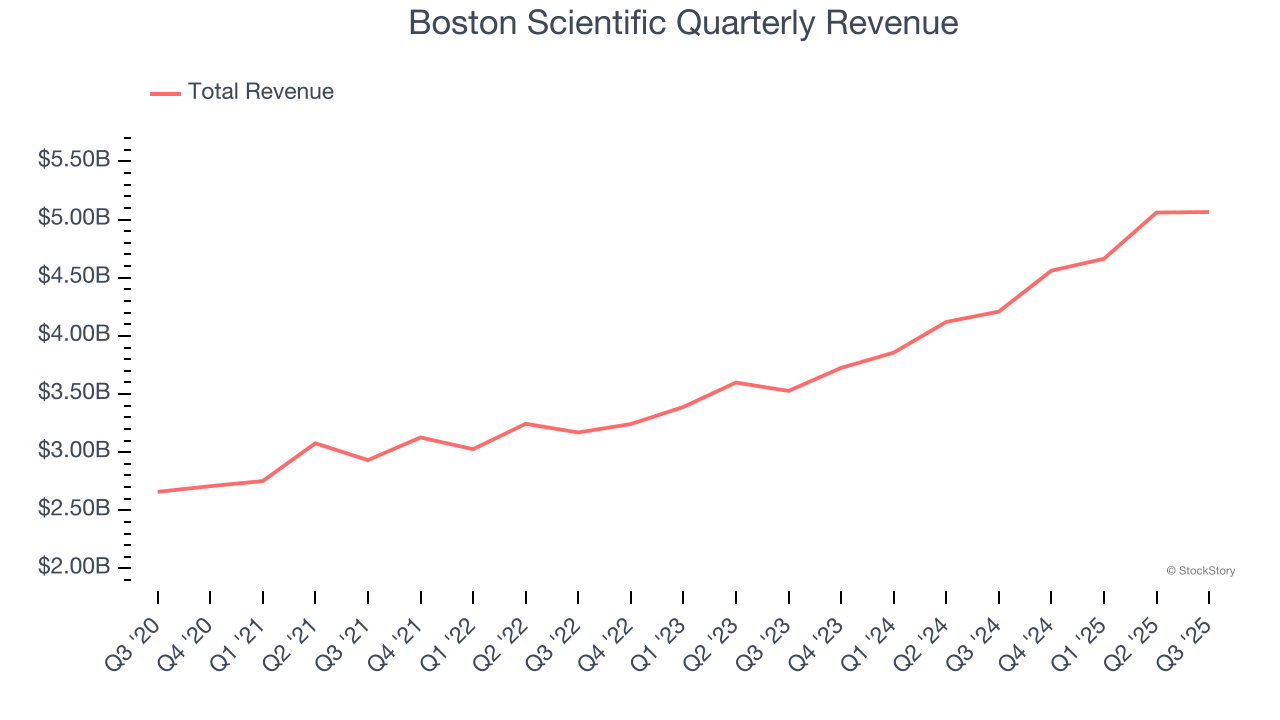
Long-term growth is the most important, but within healthcare, a half-decade historical view may miss new innovations or demand cycles. Boston Scientific’s annualized revenue growth of 18.6% over the last two years is above its five-year trend, suggesting its demand was strong and recently accelerated. 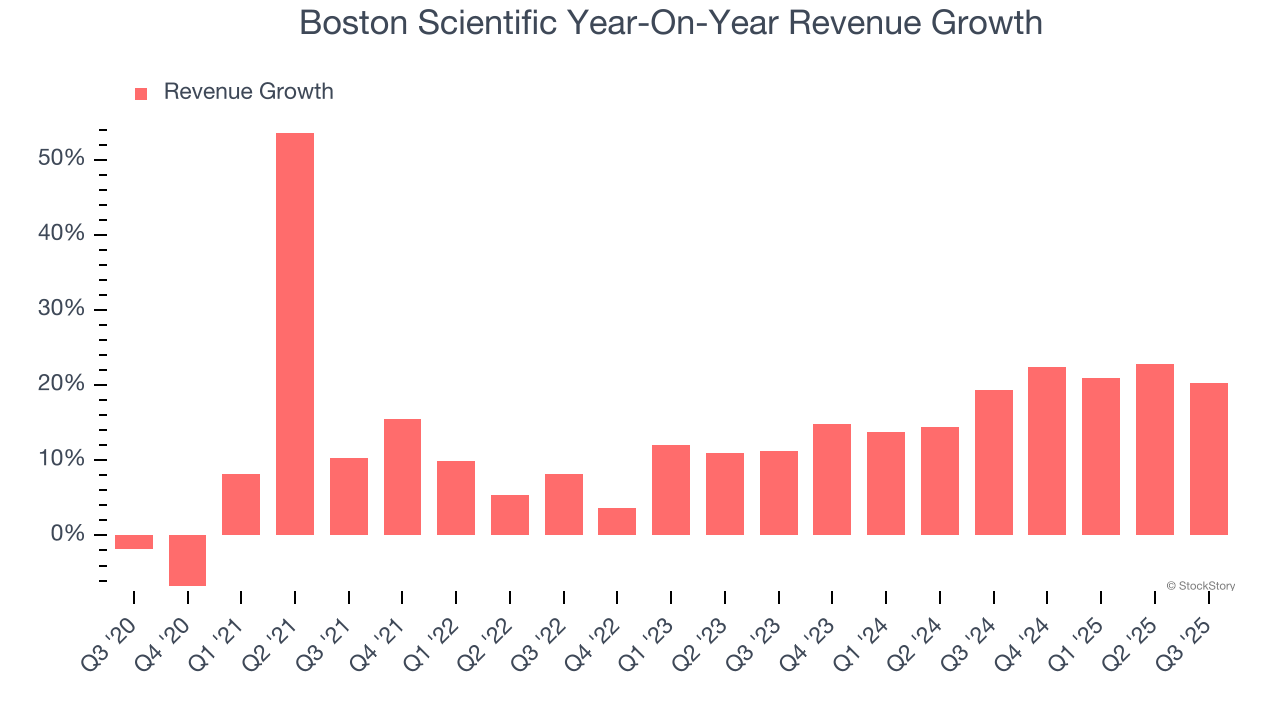
We can better understand the company’s sales dynamics by analyzing its organic revenue, which strips out one-time events like acquisitions and currency fluctuations that don’t accurately reflect its fundamentals. Over the last two years, Boston Scientific’s organic revenue averaged 16.2% year-on-year growth. Because this number is lower than its two-year revenue growth, we can see that some mixture of acquisitions and foreign exchange rates boosted its headline results. 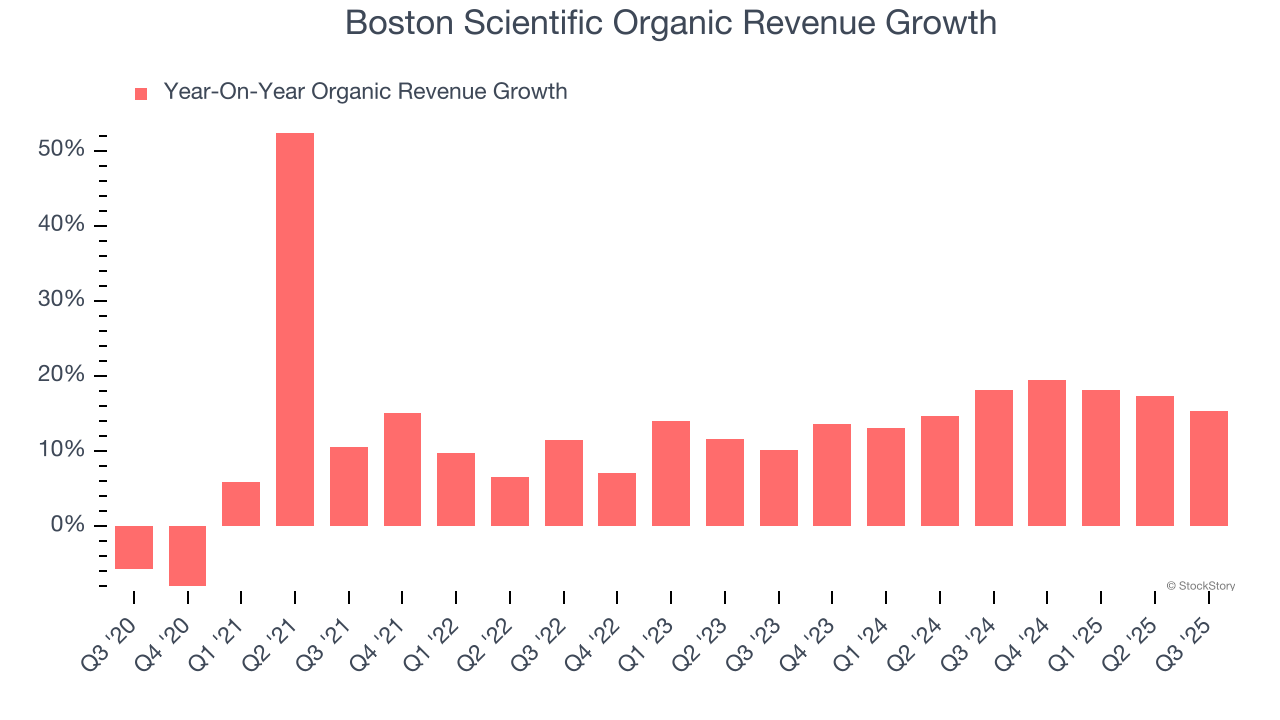
This quarter, Boston Scientific reported robust year-on-year revenue growth of 20.3%, and its $5.07 billion of revenue topped Wall Street estimates by 1.9%. Company management is currently guiding for a 15.5% year-on-year increase in sales next quarter.
Looking further ahead, sell-side analysts expect revenue to grow 11.4% over the next 12 months, a deceleration versus the last two years. We still think its growth trajectory is attractive given its scale and suggests the market is forecasting success for its products and services.
Unless you’ve been living under a rock, it should be obvious by now that generative AI is going to have a huge impact on how large corporations do business. While Nvidia and AMD are trading close to all-time highs, we prefer a lesser-known (but still profitable) stock benefiting from the rise of AI. Click here to access our free report one of our favorites growth stories.
Operating Margin
Operating margin is a key measure of profitability. Think of it as net income - the bottom line - excluding the impact of taxes and interest on debt, which are less connected to business fundamentals.
Boston Scientific has done a decent job managing its cost base over the last five years. The company has produced an average operating margin of 14.6%, higher than the broader healthcare sector.
Looking at the trend in its profitability, Boston Scientific’s operating margin rose by 8.6 percentage points over the last five years, as its sales growth gave it operating leverage. Zooming in on its more recent performance, we can see the company’s trajectory is intact as its margin has also increased by 2.2 percentage points on a two-year basis. These data points are very encouraging and show momentum is on its side.
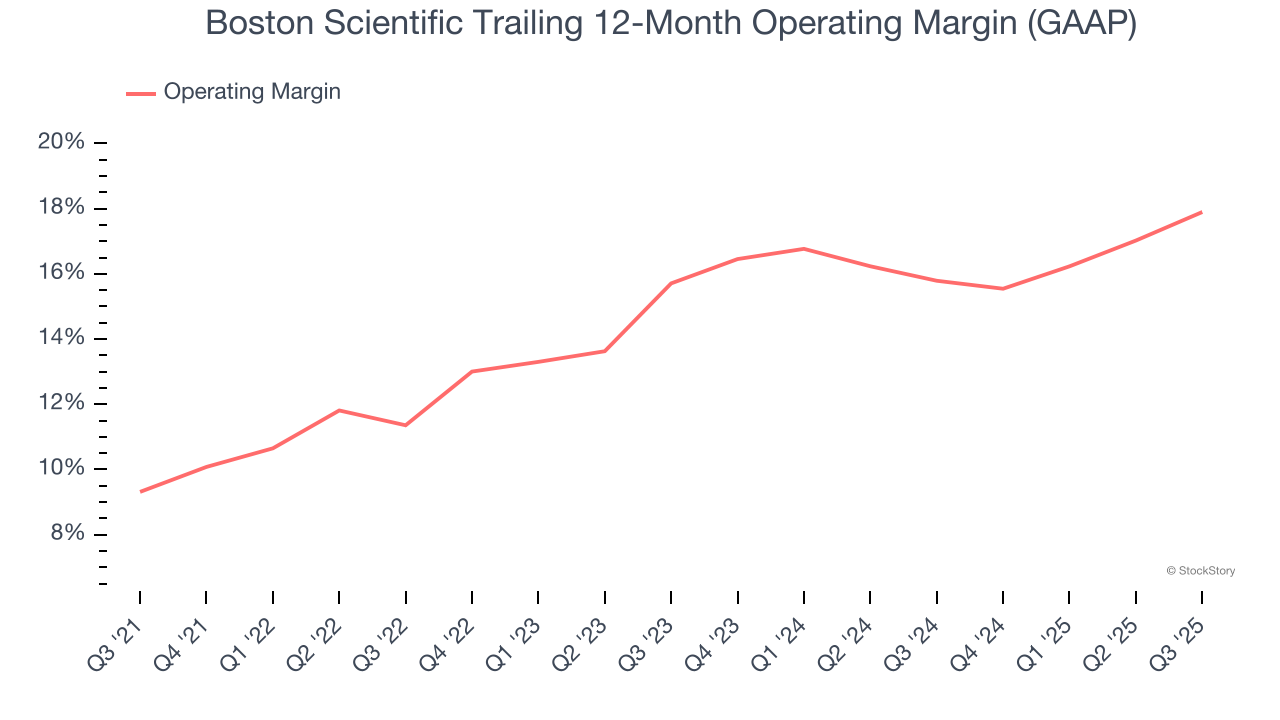
This quarter, Boston Scientific generated an operating margin profit margin of 20.7%, up 3.3 percentage points year on year. This increase was a welcome development and shows it was more efficient.
Earnings Per Share
Revenue trends explain a company’s historical growth, but the long-term change in earnings per share (EPS) points to the profitability of that growth – for example, a company could inflate its sales through excessive spending on advertising and promotions.
Boston Scientific’s EPS grew at an astounding 19.8% compounded annual growth rate over the last five years, higher than its 13.9% annualized revenue growth. This tells us the company became more profitable on a per-share basis as it expanded.
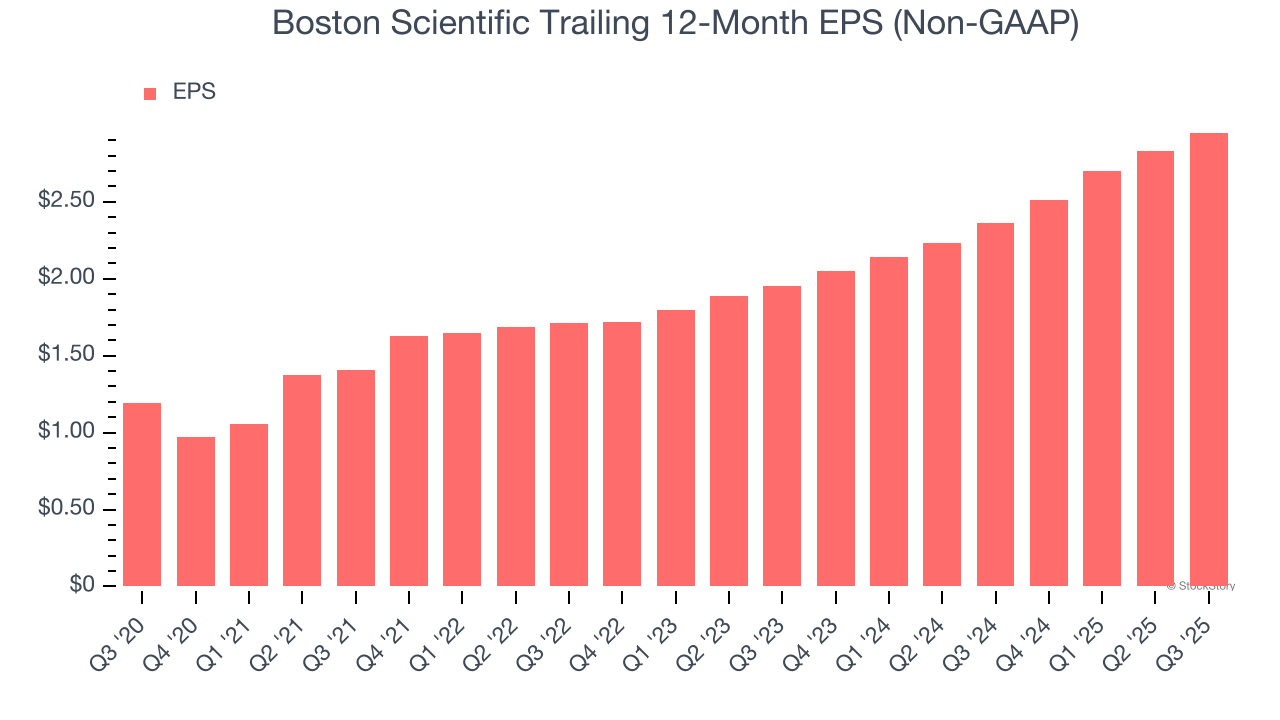
Diving into the nuances of Boston Scientific’s earnings can give us a better understanding of its performance. As we mentioned earlier, Boston Scientific’s operating margin expanded by 8.6 percentage points over the last five years. This was the most relevant factor (aside from the revenue impact) behind its higher earnings; interest expenses and taxes can also affect EPS but don’t tell us as much about a company’s fundamentals.
In Q3, Boston Scientific reported adjusted EPS of $0.75, up from $0.63 in the same quarter last year. This print beat analysts’ estimates by 5.1%. Over the next 12 months, Wall Street expects Boston Scientific’s full-year EPS of $2.95 to grow 10.3%.
Key Takeaways from Boston Scientific’s Q3 Results
We enjoyed seeing Boston Scientific beat analysts’ organic revenue expectations this quarter. We were also glad its revenue guidance for next quarter exceeded Wall Street’s estimates. Overall, we think this was a decent quarter with some key metrics above expectations. Investors were likely hoping for more, and shares traded down 1.4% to $98.47 immediately following the results.
So should you invest in Boston Scientific right now? The latest quarter does matter, but not nearly as much as longer-term fundamentals and valuation, when deciding if the stock is a buy. We cover that in our actionable full research report which you can read here, it’s free for active Edge members.
